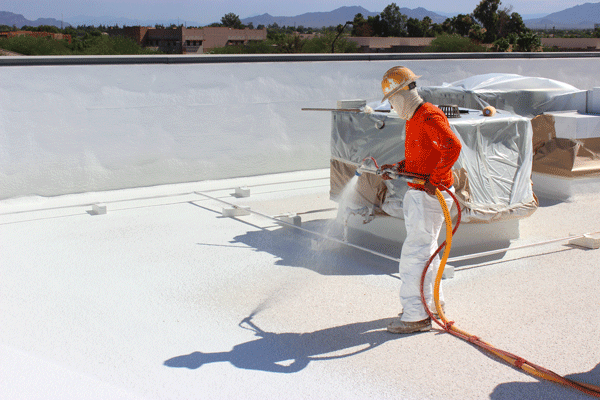Exploring Different Types of Roof Coatings: A Guide to Protecting Your Roof

Roof coatings are a vital component of roofing systems, providing protection, insulation, and longevity to your roof. Whether you’re looking to extend your roof’s lifespan, improve energy efficiency, or enhance its appearance, there’s a roof coating designed to meet your specific needs. In this article, we’ll delve into the various types of roof coatings available in 2023 and their unique benefits.
1. Acrylic Roof Coatings
Acrylic roof coatings are popular for their versatility and durability. They are typically water-based and known for their excellent UV resistance. Acrylic coatings create a seamless, protective layer that can extend the life of your roof and improve energy efficiency by reflecting sunlight.
Benefits: Acrylic coatings are easy to apply, provide good weather resistance, and can be used on various roof types, including metal, single-ply, and asphalt.
2. Silicone Roof Coatings
Silicone roof coatings are known for their exceptional durability and resistance to extreme weather conditions. They create a waterproof membrane that protects the roof from water damage, UV radiation, and temperature fluctuations. Silicone coatings are highly reflective, making them a popular choice for cool roofing systems.
Benefits: Silicone coatings are moisture-cured, making them suitable for flat and low-slope roofs. They offer long-lasting protection and require minimal maintenance.
3. Polyurethane Roof Coatings
Polyurethane roof coatings provide robust protection against water infiltration and weathering. They are often used in high-traffic areas of the roof due to their impact resistance. These coatings are available in both solvent-based and water-based formulations.
Benefits: Polyurethane coatings create a seamless and flexible membrane that can withstand foot traffic and harsh weather conditions.
4. Bituminous Roof Coatings
Bituminous roof coatings are asphalt-based coatings that provide excellent waterproofing and UV resistance. They are commonly used on built-up roofing (BUR) systems and modified bitumen roofs. Bituminous coatings come in both solvent-based and water-based options.
Benefits: These coatings offer reliable waterproofing and can extend the life of asphalt-based roofing systems.
5. Cool Roof Coatings
Cool roof coatings are specially designed to reflect sunlight and absorb less heat, helping to reduce indoor cooling costs. They come in various formulations, including elastomeric, acrylic, and silicone. Cool roof coatings are an environmentally friendly option that can contribute to energy savings and reduce the urban heat island effect.
Benefits: Cool roof coatings can significantly lower rooftop temperatures, enhance energy efficiency, and extend the life of the underlying roof.
Cool Roof Coatings
For more information on cool roof coatings and their benefits, visit Cool Roof Biz, a leading provider of cool roofing solutions.
In conclusion, the type of roof coating you choose should align with your roofing material, climate, and specific goals. Whether you’re looking to enhance energy efficiency, extend the life of your roof, or protect against harsh weather conditions, there’s a roof coating that can meet your needs. Regular roof maintenance and the application of the right coating can prolong the life of your roof and provide long-term cost savings. If you’re considering cool roof coatings or other roofing solutions, consult with a roofing professional to determine the best option for your specific circumstances.